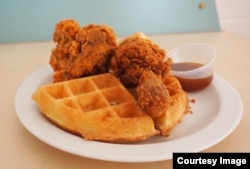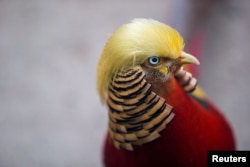Where Does Pork and Beef Come From
Now, Words and Their Stories from VOA Learning English.
On this program nosotros often talk about the origins of words and expressions that we use in American English. We as well talk well-nigh how nosotros use them in everyday conversations.
Today we talk about animals--and animals we eat. In English, these two categories often have different names. Pigs turn into pork. Cows plow into beef. Sheep is mutton. Calves are veal. And deer is venison.
But why practice we phone call these animals different names when we prepare them for a meal? Why is it "pig" on the farm but "pork" in a sandwich?
The reply is the Norman Conquest of Uk in 1066. That is when many French words became part of the English language. Many of those French words related to the battlefield, such as "ground forces" and "majestic." Many related to government and taxation.
And many others related to nutrient.
When animals were in the stable or on the farm, they kept their Former English language names: pig, moo-cow, sheep and dogie. But when they were cooked and brought to the table, an English version of the French word was used: pork (porc), beef (beouf), mutton (mouton) and veal (veau).
On several websites, word experts claim that this change shows a grade difference between the Anglo-Saxons and the French in U.k. at the time of the conquest.
Because the lower-grade Anglo-Saxons were the hunters, they used the Erstwhile English language names for animals. But the upper-class French saw these animals simply at mealtimes. So, they used the French word to describe the prepared dishes. Today, modern English speakers — regardless of social form — take come to utilize both.
Nonetheless, the words "deer" and "venison," however, are a bit more complicated.
Etymology Online says "venison" comes from an Old French discussion from the 1300s (venesoun) pregnant "'meat of large game,' particularly deer or boar." And that Old French word comes from a Latin word (venation) meaning "a hunt, hunting, or the chase."
Following the Norman Conquest of 1066, whatsoever hunted animal was chosen venison after it was killed. And probably considering deer were killed more whatsoever other animate being, "venison" came to mean "deer meat."
Still, "chicken" and "fish" remain largely unchanged.
However, sometimes we utilize the word "poultry" when talking about ownership a chicken, turkey, or other like bird to eat. For instance, a grocery store may have a place called "the poultry department."
But we don't apply "poultry" when we order chicken or turkey at a eatery, or serve it at a meal. We just say "chicken" or "turkey."
For example, if I desire to order my favorite dish, which is popular in the southern role of the The states, I will say, "I'll have the chicken and waffles, please." I would never order "poultry and waffles."
Lesser mutual birds, such as quail and pheasant, simply go by their own names.
What about fish?
The French word for "fish" is "poisson." Some give-and-take experts doubtable that "poisson" is also close to the English word "toxicant" to become a mutual food word.
Afterwards all, even the nutrient-rich civilisation of France cannot overcome the fact that eating poison might kill you or at least make you sick. Equally a effect, anything that even sounds like "poison" will probably be an unpopular choice at mealtimes.
And that bring us to the end of another Words and Their Stories.
In your language, do the words for animals change when you consume them? Let u.s. know in the Comments Section!
Thanks for joining u.s.a.. I'm Anna Matteo.
I'1000 William the Conqueror Britain's first Norman king. I plant renown and won my crown at the Battle of Hastings.In September of 1066 …"
Anna Matteo wrote this story for VOA Learning English. Kelly Jean Kelly edited the story.
______________________________________________________________
Words in This Story
category – northward. a group of people or things that are similar in some way
Norman Conquest – This major event in history is when William, knuckles of Normandy, took control of England. His of import victory at the Battle of Hastings (October. 14, 1066) resulted in profound political, authoritative, and social changes in the British Isles
conquest – north. the act of taking command of a land, city, etc., through the use of force
royal – adj. of, relating to, or subject to the crown
stable – due north. a edifice in which animals are kept, fed, and cared for
poultry – due north. birds (such as chickens and ducks) that are raised on farms for their eggs or meat
quail – due north. an Old Earth migratory game bird : a kind of small wild bird that is often hunted
pheasant – n. a large bird that has a long tail and is often hunted for food or sport
overcome – v. to defeat (someone or something) : to successfully deal with or proceeds command of (something difficult)
Source: https://learningenglish.voanews.com/a/words-and-their-stories-pig-or-pork-cow-or-beef/4104856.html



0 Response to "Where Does Pork and Beef Come From"
Post a Comment